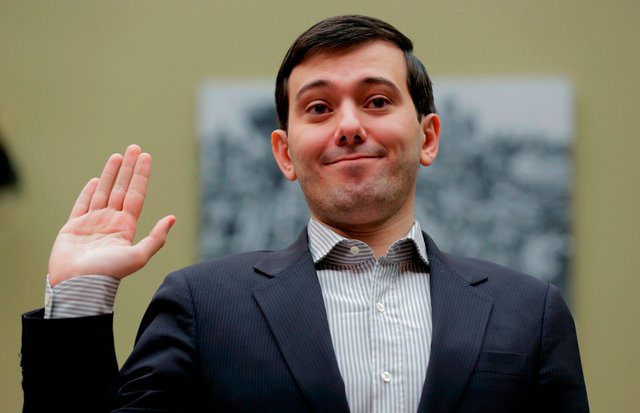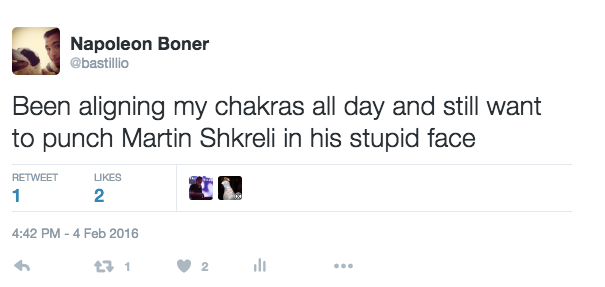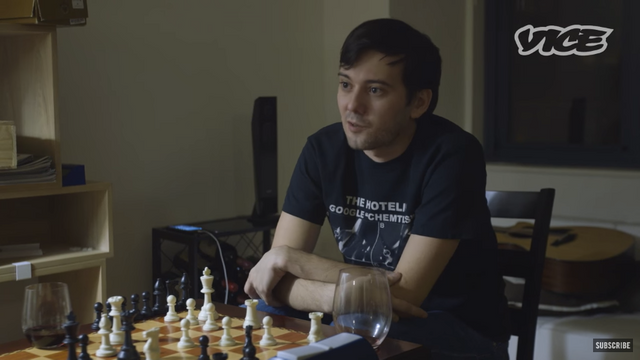Why I've Completely Changed My View on Martin Shkreli

By now, I'm sure you have heard at least one of the countless times Donald Trump has angrily declared the media is crooked and attempting to skew his image. And while it's easily arguable that his staff and campaign do equally, if not more harm to his image than the press (that's for another day), it isn't news that the media has a bias and agenda that they follow. We often forget that they are, after all, a form of entertainment, and should be viewed as just that; rather than some all-knowing-all-telling entity.
The Media's Introduction of Mr Shkreli
September of last year is when I first heard of Martin Shkreli. For those of you who are unaware of him, here's a very brief crash course: Shkreli was the CEO of Turing Pharmaceuticals, which holds the manufacturing license for a drug named daraprim. Daraprim is a medication used to treat toxoplasmosis, a parasitic condition often found in cancer patients and/or individuals with compromised immune systems (fellow Joe Rogan Experience listeners may have heard of this disease before). Shortly after acquiring Turing, Shkreli jacked the price of the drug from $13.50 a pill to $750, an increase of over 5,000%. For obvious reasons, this infuriated people once the media broke the news and started disseminating their reports, complete with photos of Shkreli's annoying, white priveleged smirk.

Here Come the Pitchforks
How could somebody so blatantly disregard the well-being of individuals for a profit? How disgusting of a human being do you need to be to try to make money off of a disease? With media outlets pouring this narrative down our throats, the onslaught of angry Americans was sure to soon follow. I, along with so many others, was so infuriated that I had to take to Twitter and inform my 32 followers of my outrage.

What Was Left Out of the Narrative?
After recently stumbling across a YouTube interview Shkreli had given VICE news earlier this year, it rekindled my interest in the story. It was really the first time I had ever bothered to hear his side of the story, apart from a few miscellaneous tweet responses here and there to some of the attacks he had been receiving. After hearing him talk about the story in such a level-headed (albeit sarcastic as shit also, but that's his style) way, while giving out information and facts to the narrative that the media had completely left out, it made me want to dig a little deeper down the rabbit hole.
The pharmaceutical industry is a business. Period. As such, businesses need profits for operating costs, to keep shareholders happy, research and development costs, etc. But what if there is drug that hasn't been updated, researched, or improved upon in over 60 years? Why have there have been zero attempts to improve upon a potentially life saving drug in this niche market? Drug companies often buy out drugs they see as undervalued and raise the prices, increasing profits, but also increasing the money they can allocate to improve on said medications. People forget, or are just unaware, that's exactly what the entire pharmaceutical industry does, and Shkreli's company was far from an anomaly. In our economy, this encourages competition, which can in turn drive the price down, ultimately. So, essentially, the market forces will dictate the price (should sound a little familiar from 8th grade economics). In fact, Imprimis Pharmaceuticals offered up a $1 version of a similar drug, last October, that is still awaiting approval from the FDA.
Had none of this happened, it's safe to bet that the drug would still be remaining in its same dormant state. When Turing Pharmaceuticals acquired daraprim, it began the momentum that ultimately would breath new light into the drug and give other companies a reason to look at it.

So What the Hell am I Getting at?
It's obvious this country, myself included, can easily be whipped into a mob mentality. One needs to look no further than this years election for some juicy examples. That being said, I think it's crucial that we never take anything for face value from the news/media. Their job, much like big pharma's, is to make money. Period.
It's indicative of our culture to point fingers and use a scape goat for issues that anger us. In this case, the media presented us with an issue (however secretly veiled it may have been), but they also attached a face to this issue. An easily accessible and easily hateable face. Instead of addressing the underlying problems or issues as to how an individual could carry out such 'injustices,' we became easily distracted and were all focused on hating Martin Shkreli and everything we thought he stood for. Instead of taking a step back and trying to view the situation objectively, we digest whatever information we're given and move onto the next controversy, however palatable it may or may not be.
Even if you disagree with his positions and what him and his company did, threatening his life and sending hate mail will not change the laws that are in place to allow for such activity in the pharmaceutical industry in the first place. If politicians are so outraged at what Shkreli has done, why aren't they gathering and attempting to change the laws that allow for it?
None of this was written to try to persuade or shift anyone's views of Martin Shkreli. It was, however, intended to get the message across that we need to be more cognizant to the fact that there are always two sides to issues, nothing is black and white. Before we pick up our pitchforks and demand justice, we need to take a step back as a society and objectively view both sides before calling for the death of an individual.
For someone who receives death threats daily and is considered 'the most hated man in America,' I think he's held his shit together rather well.
You've gained my respect, Mr Shkreli. Troll away.
He is hilarious on Twitter and on the Discord channel when he joins.
I agree, I love watching the banter back and forth on twitter now that I have a 1% understanding of his sense of humor
👍🏼👍🏼
Thanks for the background. This is why I tend to watch longer-form news shows like Frontline, and try to get the same story from multiple vantage points (like the BBC). I like VICE, too, the little of it I've read.